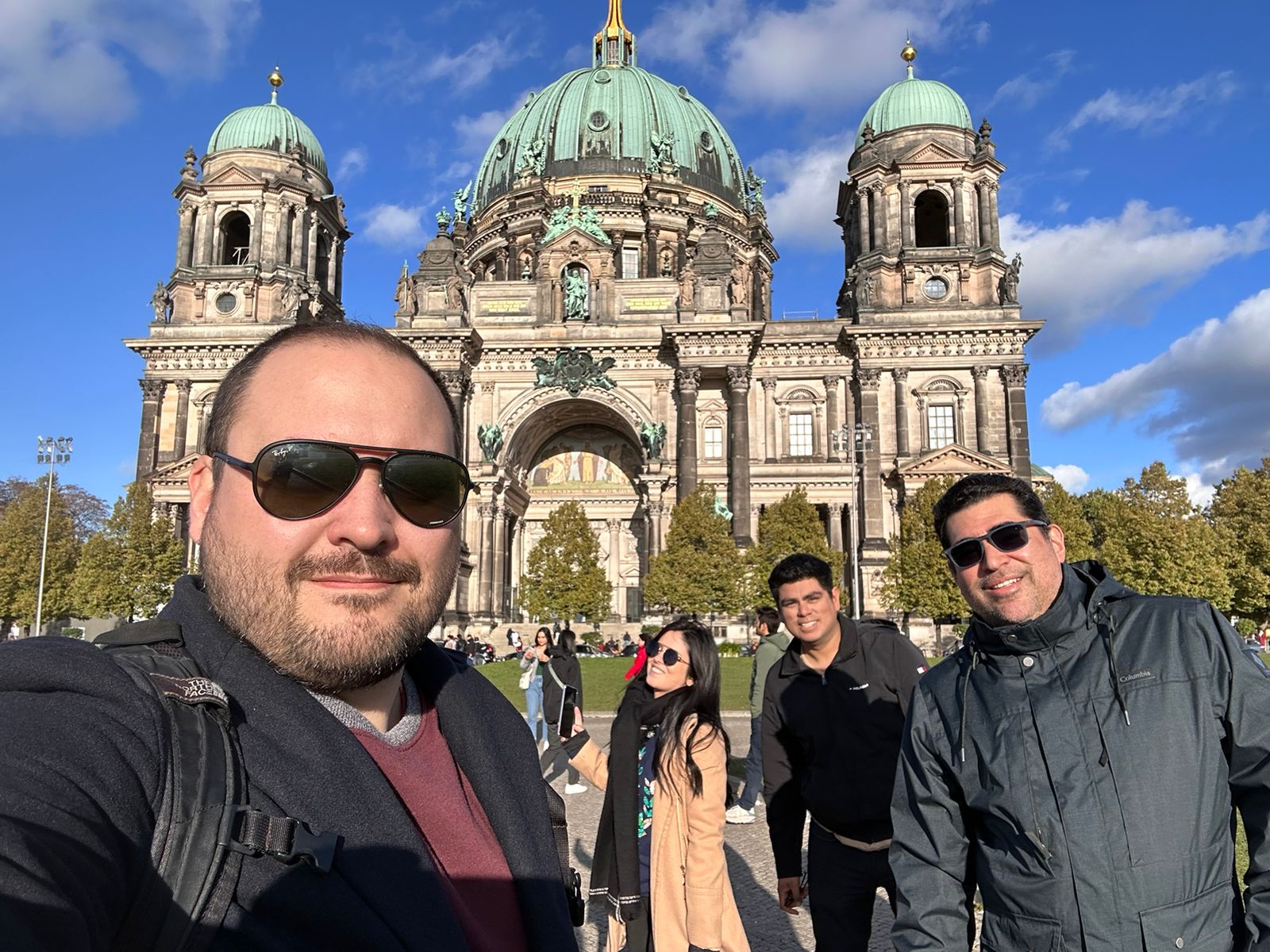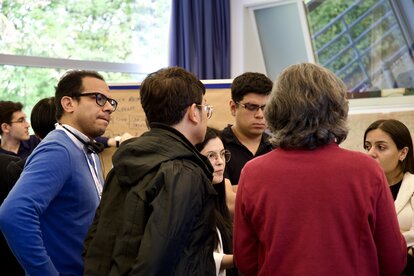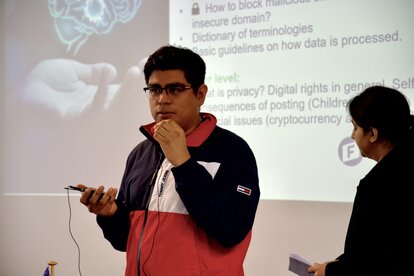IAF
From Gummersbach to Berlin: Learning about the defense of human rights on the internet

This October I took part in the seminar “The defense of human and civil rights on the internet, in society, and in the business world” organized by the International Academy of Leadership (IAF) of the Friedrich Naumann Foundation for Freedom (FNF). As a project coordinator at the Institute Pro Libertad (IPL) and a human rights activist, it has been a tremendous opportunity for me. I have gained insights into a comprehensive and cutting-edge approach to human rights in the globalized and digital world we live in. The seminar addressed discussions on human rights defense in online spaces and the new challenges posed by artificial intelligence, governments, and businesses.
Additionally, the seminar, held at the Gümmersbach (Germany) headquarters of IAF, provided participants with an enriching cultural exchange, as we represented 21 different nationalities: Pakistan, Peru, Turkey, Kosovo, Tunisia, Honduras, Argentina, Taiwan, Serbia, Philippines, Georgia, Panama, Tanzania, Sri Lanka, Lebanon, Thailand, among others.
I applied for the seminar through the Andean Countries office of the FNF, and I was thrilled to learn that I had been admitted. This marked my third time participating in an IAF seminar. In 2016 and 2017, I attended the seminars “Leadership for Young Leaders" and “Moderation: facilitation and program design", respectively. My experience in these previous courses had been outstanding, so I knew that this new opportunity would be no different.

The Topics
The recent program I participated in began with a reflective exercise on the extent of privacy in our daily lives—from waking up, checking our phones, connecting to the internet, commuting to work, sharing information on social media, to passing by surveillance cameras on the streets or in our own buildings, and so on. Subsequently, the moderators, Hussam Al Erhayel (Jordan) and Enikö Gal (Hungary), provided a brief introduction to human rights from a liberal perspective and an overview of digital rights, including the right to privacy, freedom of expression online, and access to the internet.
As the seminar progressed, participants became more aware that we have been gradually surrendering our privacy to various social networks, applications, and other free programs, accepting terms and conditions to which we have given little importance or, in some cases, completely ignored. We realized that we are now in a scenario of complete invasion of personal data, where social networks sell our information to companies and governments.
We learned that the discussion on the treatment of personal data has been ongoing since 1996. In those early years, there was an emphasis on self-regulation; however, it was later confirmed that this approach was not sufficient. The moderators explained that the most significant event leading to the prioritization of national security over the right to privacy in the discussion was the terrorist attack on the Twin Towers in New York on September 11. At that moment, the invasion of personal data was justified for the identification of terrorists.
The program also delved into the topic of freedom of expression and hate speech. The importance of this freedom for the functioning of liberal democracy was emphasized. We examined cases where hate speech on social media had led to or intensified violence in the offline world against specific individuals and marginalized communities. From there, we discussed to what extent platforms are responsible for what is posted on them and what their role should be as content moderators. This discussion was enriched by presentations from Frederic Kupsch, an expert from the Academy for the Protection of European Human Rights at the University of Cologne, and Anna Wegscheider, legal advisor at HateAID, an organization that addresses cases of digital violence.
The moderators addressed the dangers of the development of spyware, malicious software that extracts information, posing a threat to democracy and citizens' privacy, as these are currently being acquired by governments. However, we also learned about good practices in the use of technology from certain states. The seminar featured the youngest member of the Estonian parliament, Kristy Enn Vaga, who discussed his country's experience as the first digital government.
During the seminar, we debated the challenges and benefits posed by AI for people's lives. On this topic, we had the opportunity to hear from Dr. Francesca Palmiotto, a postdoctoral researcher at the Center for Fundamental Rights at Hertie School. She presented a case study on how officials in the United States use AI to translate asylum requests received in languages other than English. The issue observed is that there are many errors and information losses in its use, adversely affecting asylum applicants' approval process.

Visits to Cologne and Berlin
The seminar included an excursion to Cologne and three nights in Berlin. In the first city, we visited the University of Cologne. Afterward, we had free time. In my case, along with other classmates, we climbed the 157 meters of the Cologne Cathedral. This Gothic-style temple is a UNESCO World Heritage site, and its construction dates back to the 13th century. During World War II, the cathedral suffered damage, but its main structure remained intact.
Later, we traveled to Berlin. This visit generated much anticipation for me as I would have the opportunity to explore its streets full of history again, and also because it is known as the capital of techno, an electronic music genre that I am passionate about. This city surprised me from the first night with dinner with Salim Amin, a political advisor on Human Rights and International Rule of Law at FNF, and the light festival that illuminated Berlin's key monuments in vibrant colors, such as the Brandenburg Gate and the Berlin Cathedral.
In Berlin, as part of the program, we visited the Berlin-Hohenschönhausen Memorial, the former Stasi prison in East Germany that operated until 1989. This place served as a center for political repression against dissidents and anyone suspected of attempting or even just desiring to escape to West Germany. It was a highly impactful visit as the guide explained the surveillance and eavesdropping system, the methods of psychological and physical torture endured by prisoners for months, and we entered the different types of cells that awaited them.
In this city, we also had the opportunity to listen to presentations by experts such as Anna Wegscheider, Anna Biselli (co-editor-in-chief of Netzpolitik.org), Dr. Francesca Palmiotto, and met with the organization Mnemonic, a global organization working to help human rights defenders effectively use digital documentation of human rights violations and international crimes.
Conclusions
Other topics addressed by the seminar included blockchain, the digital divide, and the protection of human rights in business.
The entire seminar was a great experience. The dedication of the entire team behind the organization and execution of the program, from the director, moderators, assistant, interpreters, administrative staff, to the kitchen staff, is evident in the quality of their work. I cannot fail to mention that it was a fantastic group of people I met as participants from around the world dedicated to the protection of human rights, and the Latino group we formed became very close-knit. The IAF academy always exceeds expectations.